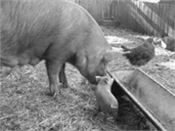|
New Soy Protein Concentrate Can Be Used In Weanling Pigs Diet

URBANA, ILL.
A new source of soy protein concentrate can be used in diets fed to weanling pigs without negatively affecting digestibility of energy or nutrients, according to research conducted at the University of Illinois.
“Soy protein concentrate is typically produced by using an alcohol extraction process to remove soluble carbohydrates from soybean meal,” says Hans H Stein, professor of animal sciences at the University of Illinois. “However, a new soy protein concentrate has been developed which combines a non-alcohol extraction process with enzymatic treatment of soybean meal.”
Stein, along with visiting scholar Maryane S. Oliveira, conducted three experiments to evaluate the nutritional value of this new soy protein concentrate product.
The soy protein concentrate contained 61.2 percent crude protein compared with approximately 47.7 percent for dehulled soybean meal. The standardized ileal digestibility (SID) of isoleucine and leucine and some dispensable amino acids was greater in soy protein concentrate compared with soybean meal, but for crude protein and most amino acids, no difference between soy protein concentrate and soybean meal was observed.
Soy protein concentrate contained 3,479 kcal/kg digestible energy (DE) and 3,299 kcal/kg metabolizable energy, compared with 3,319 and 3,093, respectively, in soybean meal. Removal of oligosaccharides, which weanling pigs cannot digest, and other soluble carbohydrates from soybean meal resulted in greater concentration of crude protein, which is likely the reason for the greater concentration of digestible energy in the soy protein concentrate.
There was no difference in the standardized total tract digestibility (STTD) of phosphorus between soy protein concentrate and soybean meal, but for both ingredients, addition of microbial phytase increased phosphorus digestibility by about 35 percent.
“Soy protein concentrate is one way of feeding high-quality soy protein to weanling pigs,” says Stein. “This new technology produces soy protein concentrate that is high in digestible amino acids and energy.”
Funding for this research was provided by Midwest Ag Enterprises Inc., of Marshall, MN.
The paper, “Digestibility of energy, amino acids, and phosphorus in a novel source of soy protein concentrate and in soybean meal fed to growing pigs,” was published in the August issue of the Journal of Animal Science. It was co-authored by Maryane Sespere Oliveira. The full text can be found online at https://www.animalsciencepublications.org/publications/jas/articles/94/8/3343 . ∆
|
|